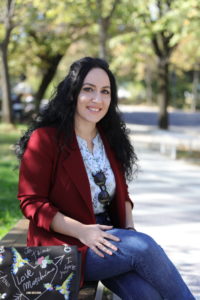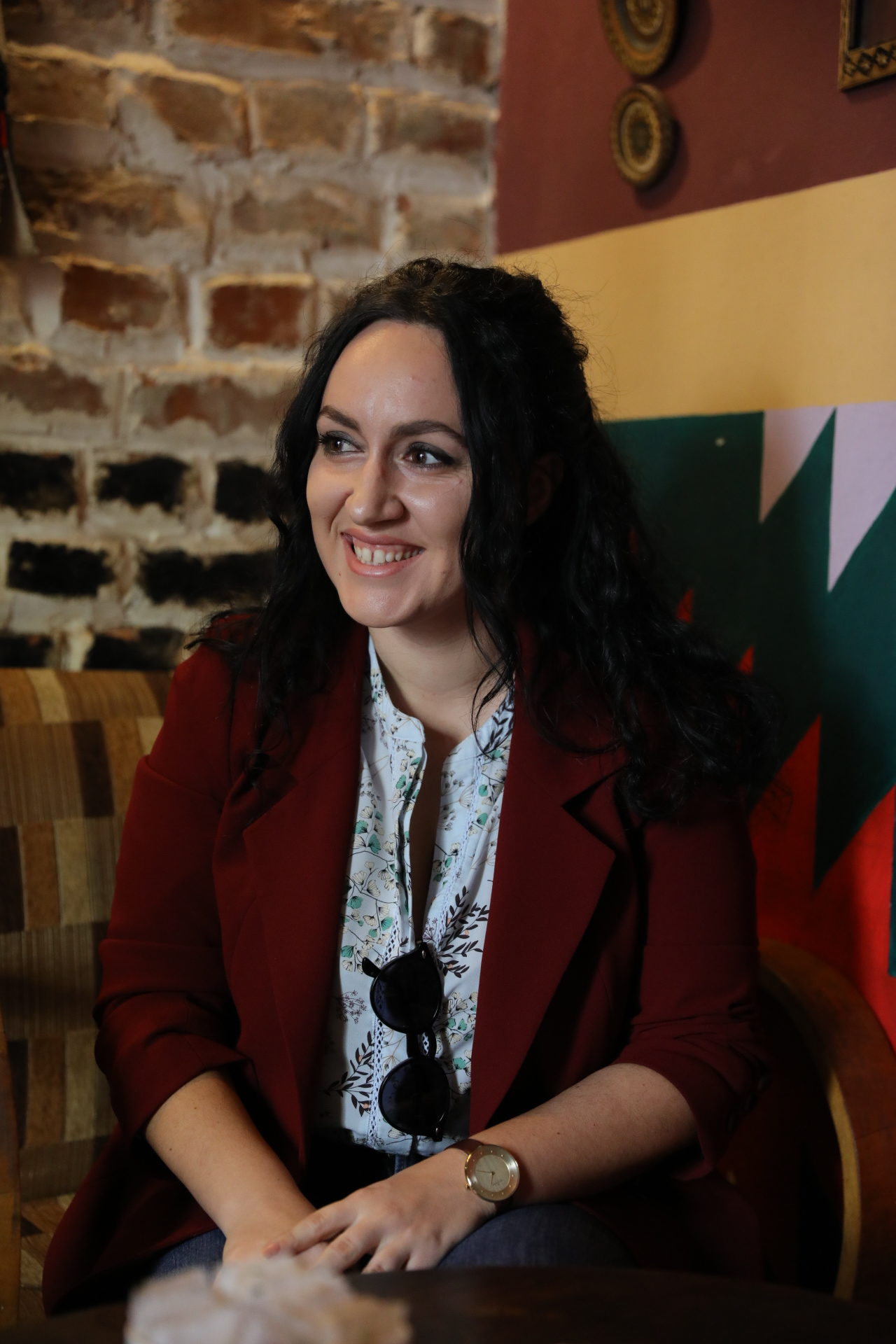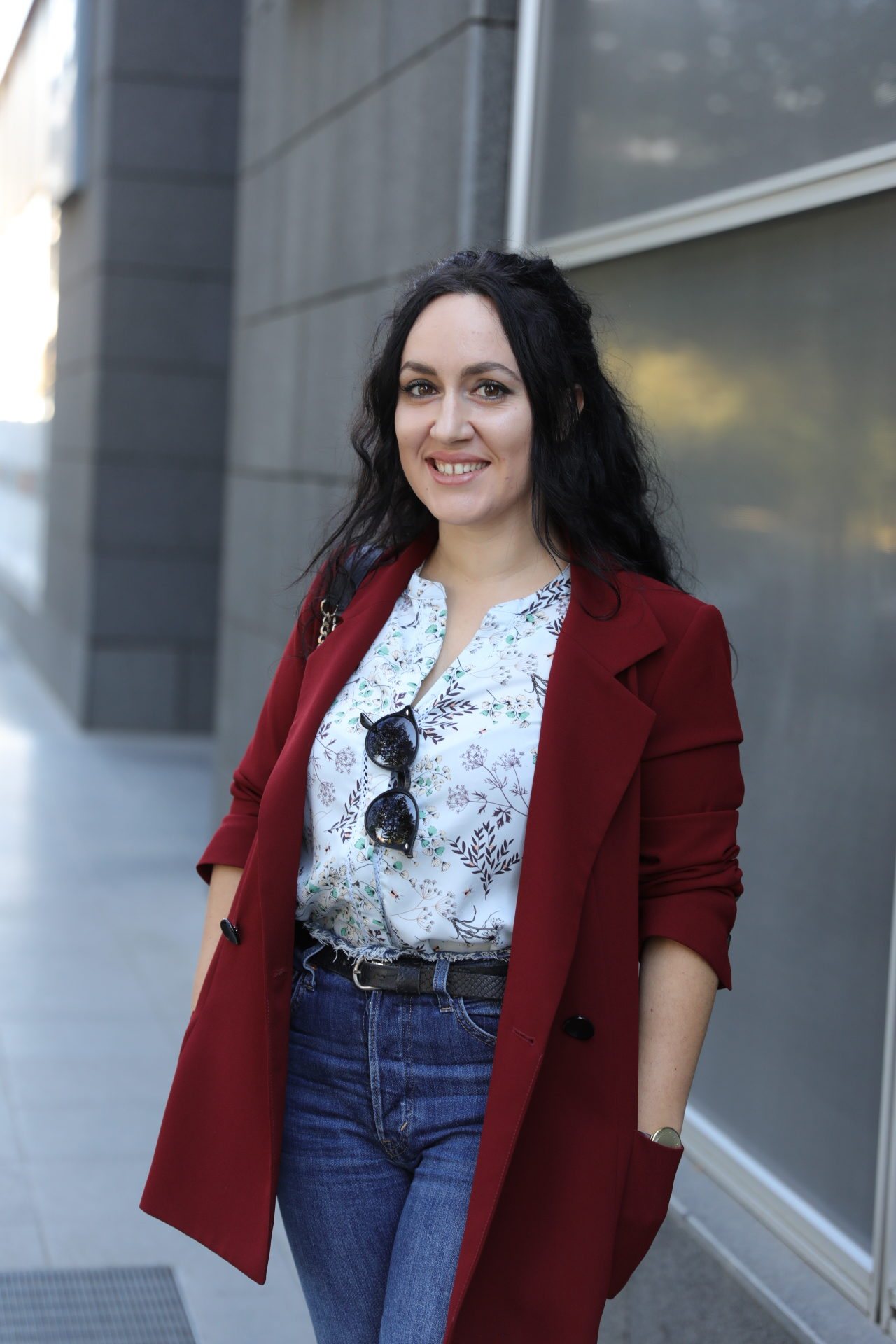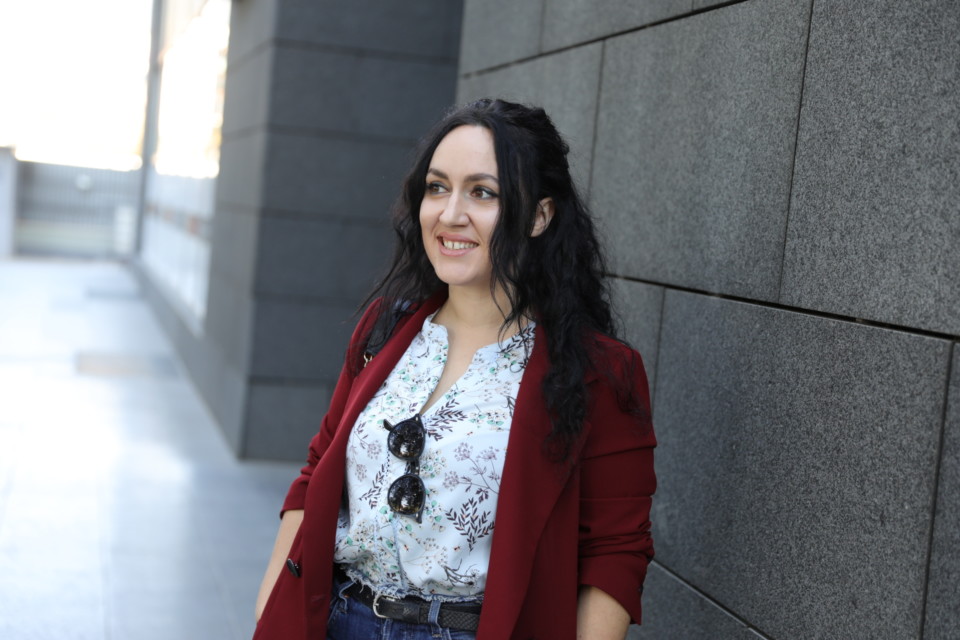A L B A
Tirana | 2019

A L B A
City — Tirana
Age — 30
Love life — Boyfriend
Profession — Business Development Coordinator
Years in Tirana — All her life, but recently moved to The Netherlands
Location — Bar Komiteti & park near Piramida
T H E T I R A N A S T O R I E S
‘WOMEN IN TIRANA
FACE A LOT
OF EXTRA
STRUGGLES’

- What is your best personality trait? “Considering the country I grew up in, I would say being open and curious to getting to know new people and new ways of living. Albania has never been particularly open to new points of view, because it has always been isolated. We were not allowed to have our own culture and language during the 500 years of occupation by the Ottoman empire. After the empire fell, World War I happened, then World War II, and then we were under communist rule. Here, there’s a certain way of doing things that’s considered the ‘right’ way, which I’ve always been against. I put myself and how I want things to be first, in spite of how the world expects me to do things. For example, as a woman you’re supposed to have an official boyfriend at, let’s say, 23, get married at 25 and probably have a kid at 27. There is social pressure, in my case from my relatives, to fit into this small frame. But by 23 I had just come back after studying in Milan for two years, and I wasn’t really interested in finding a boyfriend. And once I did get a boyfriend, from The Netherlands, I got a lot of comments as well, such as, ‘It’s a foreigner, it won’t last.’ So I think for women in Albania it’s important to know what they want, to find their voice and say, ‘No, I will do it my way’. Now that I’m emigrating to The Netherlands, I’m considered completely crazy for starting at the bottom in a new country, while my family here is in a very good place. Again, I stick to my own ideas.”
- What is your biggest life lesson? “From the latest developments I’ve learned that nothing is impossible. A long-distance relationship can work, and I can move to The Netherlands even though Albania isn’t part of the European Union. Whatever you want, just keep the faith, go for it and don’t give up.”
- What is your biggest disappointment? “When I was studying in The Netherlands, we had this career day and I gave a really good presentation in front of everyone about the Italian company where I had done my internship. The recruiter of that company started applauding me in front of everybody. Afterwards he offered me a traineeship for two years. It felt like a done deal and I was really excited. But when I gave him my cv, he said, ‘Oh, you’re Albanian? I thought you were Italian. We have a really strong requirement that it needs to be a European Union candidate.’ I did understand that, business-wise, but it felt really unfair. I had proven myself there, I got picked and then I wasn’t eligible because of that. An Italian friend of mine ended up getting the job and had a wonderful experience.”
- What is the best thing that ever happened to you? “I would definitely say my family. The way we were raised, with dignity and high moral values, is not commonplace in a country like this – and that’s important to stress, because I’m sure in a developed country it’s nothing special. My parents started from scratch and everything they’ve built, they built themselves. They gave my sister and me the opportunity to go to college, in an environment where that doesn’t usually happen, and in Albania that makes all the difference in the world. Unfortunately.”

- What is the best advice someone ever gave you? “My parents are fountains of inspiration. One of the things that my father taught me, is that there’s always a solution. I tend to get caught up in challenges that I’m facing, in little details, and the hows and the whys. I sometimes lose sight of the fact that at the end of the tunnel, there’s light.”
- What advice would you give other women in Europe? “Always trust in yourself, take care of yourself and speak up for yourself. We live in a society that makes money out of making women feel insecure, like convincing them they need makeup. So don’t be a victim of business and profit. I think in Albania the level of insecurity plays a bigger role then elsewhere, because in our macho culture women are supposed to be very beautiful. It’s changing, but it still influences women. So that’s why I say, trust in yourself, in your choices, in the way you think, in the differences you want to make in whatever society you are living in. It’s important to speak up and express your opinion in a very wide range of situations, no matter what the crowd is cheering at the moment. But circumstances in Albania are harsh, especially in the countryside. A lot of women are fighting and speaking up and not giving up, but a lot of other women think they don’t have the right background or even the right itself to speak up. I would like them to get to a point where no one gives up anymore, but I know that’s not the reality. Our economic situation leads to non-education and if those women are 18 or 20 and don’t have the opportunity to make something of themselves, they sometimes have to marry someone, and it was set up by family. Unfortunately it’s way more difficult for them than it’s for me to speak out against something like that.”
- What is your biggest fear? “Not having my loved ones by my side. Last year I lost my grandmother. It was very hard, you immediately realise what really matters in life. Another one of my biggest fears, is not being able to feel fulfilled in my career. It’s not about making it to a really high and ambitious spot, but it’s about putting effort into something that means something to me. It might be a small thing, but it can mean the world to me if I can make an impact. I really like this expression from the American life coach Tony Robbins, ‘Life is about the science of achievement and the art of fulfillment.’”
- What is your biggest sadness?
“It breaks my heart when I see people who don’t have the opportunity to have a good and fulfilling life, because they don’t have the basics. It upsets me the most when I see people in other countries facing challenges no human should face. It’s not fair, it enrages me. I’m thinking about this girl in Iran, who was still a minor when she had to get married, and was raped and tortured by her husband. When she killed him out of self defence, she was sentenced to death. Reading about such a monstrous situation is… I was living in Milan at that time and I went to this protest in front of the Iranian embassy. There were only a few of us, but for me it mattered to say, ‘I’m against this, it’s inhuman.” - What can hurt you most?
“When I don’t feel valued or carefully listened to by the people I love. It also gets me down when I’m being judged on why I have a different way of life or perspective than others. At times my relatives are disapproving of my choices, which is fine – they’re not my friends – but it can be too much. It also dampens my spirit when I’m being judged by people about where I come from, it’s very old-fashioned and inhuman. I love my people and I share some characteristics with them, but I consider myself a citizen of the world. I spoke Italian before I ever spoke Albanian, because the children cartoons I watched on television were all in that language. And the only grandmother I knew, was Greek. I have to admit I recognise myself specifically in the overreacting, emotional, passionate part of this Balkan/Mediterranean mix.” - What does Tirana mean to you?
“What I love about Tirana is the city vibe and the noise. It has the highest number of cafés per capita in the world! The Blloku area is full of young people, and new cafés and restaurants are opening all the time. I’m used to going out with my friends and laugh and share memories. And our coffee is amazing. What I dislike the most, is the amount of economic inequality here. You see very wealthy people who wear 3000 euro jackets and at the same time people who are in very big financial trouble.
The women in Tirana are also very diverse. They are strong, but it would be great if overall they would be more confident about themselves, not just about their appearances. They are smart enough. And concerning the poor women in Tirana… It’s not really my circle, so it’s difficult to be really accurate about what I’m saying. But from things I see here, I think that life is a continuous struggle for them. They are doing the best they can, but I think they are really far from where they want to be and should be. The external environment and mentality is not progressive and favourable enough. Compared to other countries, there are a lot of added struggles for women here. I think women from other European countries can take an example of the passion and strength the women here have into overcoming their struggles. We’re still fighting.”
Photos by Bora Dervishi

